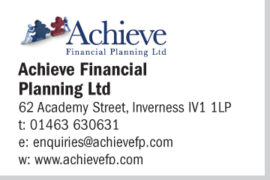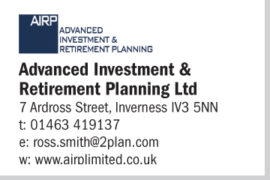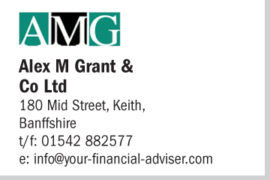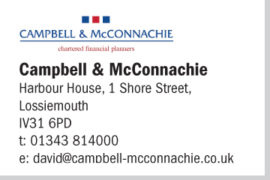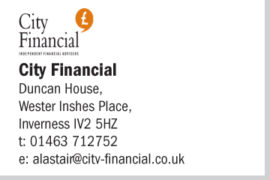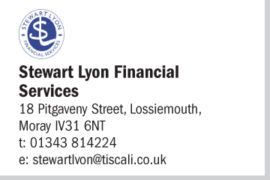INDEPENDENT FINANCIAL ADVICE ON MONEY MATTERS AROUND THE HIGHLANDS, ISLANDS & MORAY

On a miserable wet June day, it’s easy to set a financial goal – saving up for that dream holiday somewhere hot and sunny. Or if you’ve just seen your friend’s flashy new car, you might decide that buying your own dream set of wheels and driving off into the sunset is your ultimate goal. But these knee-jerk goals may divert you from what’s most important to you.
In the long-term, your goals should be to have as good a lifestyle for the whole of your life as your earnings can sustain. Unfortunately, this is often in conflict with the achievement of short-term goals. It is for you to decide what is more important.
BUYING A HOUSE
Nearly everyone wants to get onto the property ladder, and as such, there are millions of people across the country whose main financial goal is saving for a house. Government measures, such as Help to Buy and current low mortgage rates continue to make buying more financially attractive than renting. However, firsttime buyers are having to dig deeper than ever to get onto the property ladder, with the average house price in Scotland now almost £140,000 and the average deposit at £20,605*.
It’s been calculated that parents provide deposits for more than 298,000 mortgages, making the Bank of Mum and Dad the equivalent of the 10th biggest UK mortgage lender. However, if instead of upgrading your car, you set aside a sum every month to save up for your deposit by setting up a direct debit, your money should quietly build up and provide a handy sum when you need it. When you have reached your deposit goal, a good independent mortgage broker will help you find the best mortgage deals available on the market, not just from a single provider.
* Halifax, CML
PROVIDING FOR YOUR FAMILY
Once you have children, you’ll find that the financial goalposts move. Not only is there an extra strain on your spending, but there are also additional responsibilities.
The Money Advice Service suggests building up an emergency fund of three months’ essential outgoings to help in an emergency. If you don’t have an instantaccess account already, open one and use a regular direct debit to build up a safety net for when you need it.
If your children, partner or other relatives depend on your income to pay the mortgage, rent or other living expenses, you should also think about life or critical illness insurance, which will pay out a lump sum or regular payments to your family if you die. The cost of this cover per month could be less than the cost of a take-away – it’s up to you to decide what’s more important!
RETIREMENT
Given a list of twenty possible financial goals, most people will put “retirement” at the top of the list, whether it’s retiring early, buying the dream cottage in the country or simply having enough money to enjoy not working. Starting early is key to building up a good pension pot, so it’s crucial to stay opted in to your workplace pension. A small additional contribution could radically improve your quality of life in retirement – why not skip the latest phone upgrade and top up your pension?
However, it’s never too late to start investing in a pension. Tax relief on contributions plus the tax-free lump sum available at retirement, together with the income flexibility of more modern contracts, make pensions both tax-efficient and flexible. And as a result of changes in pensions legislation, it may well be more beneficial to contribute to a pension after age 55 than to an ISA or other savings product.
Get Expert Help
Charles Stewart BA, DipPFS is Principal of Stewart Lyon Financial Services, which is authorised and regulated by the Financial Conduct Authority.
visit Stewart Lyon Financial Services website
DID YOU KNOW?
Did you know that your household could be £250 a year better off by claiming the Marriage and Married Couple’s Tax Allowance

You don’t usually pay Income Tax on all of your taxable income. This is because most people qualify for one or more allowances. An allowance is an amount of otherwise taxable income that you can have tax-free each tax year.
Marriage Allowance
Married couples and those in civil partnerships can transfer up to £1,250 of personal allowance (10% of the £12,500 personal allowance for 2019/20) to their partner for 2019/20 this is sometimes referred to as the Marriage Tax Allowance.
You might be eligible for this if:
- you’re married, or in a civil partnership and are not in receipt of Married Couple’s Allowance
- one of you earns less than the Personal Allowance so is not liable to tax or liable to tax at the higher or additional rates. This means an income of less than £12,500 while your partner is a basic rate taxpayer with income between £12,501 and £50,000
- you were born after 6 April 1935.
Here’s an example.
If you earn £30,000 a year, which means you’re a basic rate taxpayer, and your partner earns £8,000 a year and so is a non-rate taxpayer, your household could be £250 better off.
A good Independent Financial Adviser can give you guidance on this and help you make he most of tax allowances that are available.
Alastair Jappy DipPFS is Managing Director of City Financial, which is authorised and regulated by the Financial Conduct Authority.
visit City Financial website
Next month’s topic is on Investment
Your Local to Highlands, Islands and Moray Contributors – Click to visit their website.

